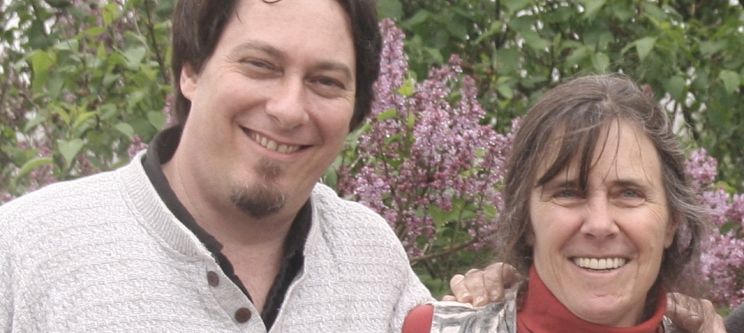Mike Auerbach Reconnecting With Science Education at Marlboro

“At Marlboro I learned to think, write and research like a scientist,” said Mike Auerbach ’97, who did his plan in molecular genetics and has been teaching chemistry and biology at Brattleboro Union High School for 11 years. “I made the transition from thinking of science as a series of concepts, formulas, facts and headlines to thinking of science as a system of related complex systems. I learned to swim in the deep water and monitor my own performance. Most importantly, I learned not just how to find correct answers, but to fashion excellent questions.”
Now Mike is returning to Marlboro 15 years later as part of a partnership between Marlboro College and the Windham Regional Collegiate High School (WRCHS) to offer dual-credit courses for area high school students. Marlboro is one of the first private institutions to collaborate with WRCHS, which has received statewide recognition for its innovative model providing a bridge to college for promising young scholars. Mike is teaching Global Science in the fall 2012 semester in collaboration with his former mentor at Marlboro, biology professor Jenny Ramstetter ’81.
“With Jenny, I learned how to think of science as a process and focus my questions, rather than thinking in terms of unfounded generalities. She was an enormous part of my growth as a student, scientist and scholar, and, if anything, she has gained stature in my memory. Now, collaborating on a series of courses, I am literally overwhelmed by the honor I feel at this opportunity. What has been the most magnificent is how well we work together and how much we see our courses as natural extensions of each other.”
High school students particularly passionate about the topic of Global Science will be invited to join college students for a spring course in Environmental Sustainability taught by Jenny and Mike on the Marlboro campus. The goal of WRCHS is to teach high school students about college-level learning and remove barriers that prevent some students from going to, or succeeding in, college.
“Students studying the sciences at the college level need to learn to be responsible for their own learning. In high school we learn problems and processes and concepts and are quizzed on these for a grade. At the college level, knowing these answers is a given, a starting point. The real work is to use those processes to examine issues that don’t have answers in the back of the book.”
Mike was planning on pursuing a graduate program in molecular genetics after Marlboro, with encouragement from his outside examiner Richard Lewontin, professor emeritus at Harvard, but the year after graduation he signed up for AmeriCorps. He served as the youth activities director at the Brattleboro Housing Authority, an experience that changed his life and turned his interests toward teaching young people. Mike also coaches youth soccer and serves on the board of the Bonnyvale Environmental Education Center.
“I always tell my students that scientists have probably identified 2 percent of the questions that we need answers to, and have learned about 2 percent of what there is to know about those topics. In college, students will start grappling with the questions that we are not in agreement about. That is where diligence and computational skills are not enough. You need those plus creativity, fascination and a dedication to clear thinking and precise, direct communication. That is what I learned at Marlboro.”
OTHER GRADUATES WORKING IN THE FIELD OF EDUCATION
- Jacob P. Dalton ‘92, Professor Tibetan Studies, UC Berkeley
- Bradford A. Jameson ‘76, Professor Biochemistry/Molecular Bio, Drexel Univ.
- Vanessa Dillman Green ‘98, Director of Higher Education and Diversity, Center for Coastal Margin Observation & Prediction, Oregon Health & Science Univ.
- Elizabeth Stearns Sims ‘86, Director Retention/First Year Programs, Paul Smiths College

